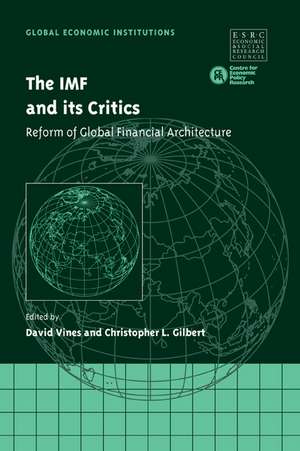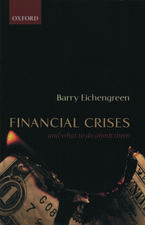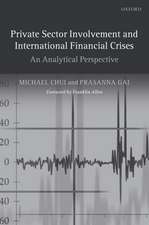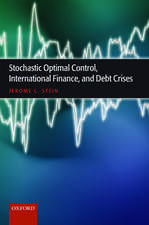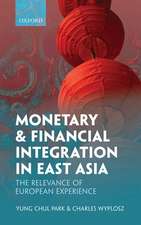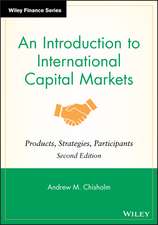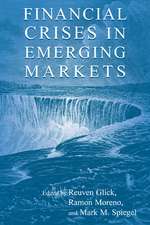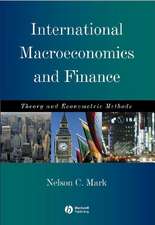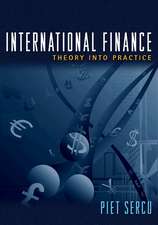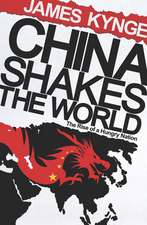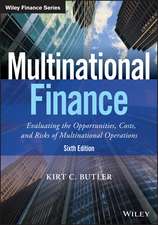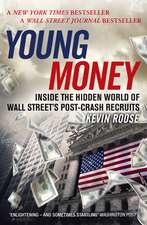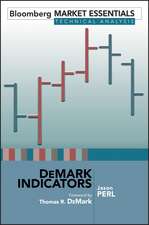The IMF and its Critics: Reform of Global Financial Architecture: Global Economic Institutions, cartea 5
Editat de David Vines, Christopher L. Gilberten Limba Engleză Paperback – 17 ian 2009
| Toate formatele și edițiile | Preț | Express |
|---|---|---|
| Paperback (1) | 454.47 lei 6-8 săpt. | |
| Cambridge University Press – 17 ian 2009 | 454.47 lei 6-8 săpt. | |
| Hardback (1) | 726.72 lei 6-8 săpt. | |
| Cambridge University Press – 25 feb 2004 | 726.72 lei 6-8 săpt. |
Preț: 454.47 lei
Nou
Puncte Express: 682
Preț estimativ în valută:
86.97€ • 91.45$ • 71.86£
86.97€ • 91.45$ • 71.86£
Carte tipărită la comandă
Livrare economică 17 aprilie-01 mai
Preluare comenzi: 021 569.72.76
Specificații
ISBN-13: 9780521100502
ISBN-10: 052110050X
Pagini: 472
Ilustrații: 11 b/w illus. 12 tables
Dimensiuni: 152 x 229 x 26 mm
Greutate: 0.69 kg
Editura: Cambridge University Press
Colecția Cambridge University Press
Seria Global Economic Institutions
Locul publicării:Cambridge, United Kingdom
ISBN-10: 052110050X
Pagini: 472
Ilustrații: 11 b/w illus. 12 tables
Dimensiuni: 152 x 229 x 26 mm
Greutate: 0.69 kg
Editura: Cambridge University Press
Colecția Cambridge University Press
Seria Global Economic Institutions
Locul publicării:Cambridge, United Kingdom
Cuprins
Introduction; 1. The IMF and international financial architecture: solvency and liquidity Christopher L. Gilbert, David Vines; 2. Progress towards greater international financial stability Andrew Crockett; 3. International coordination of macroeconomic policies: still alive in the new millennium? Lawrence H. Meyer, Brian M. Doyle, Joseph E. Gagnon, Dale W. Henderson; 4. The Report of the International Financial Institution Advisory Commission: comments on the critics Allan H. Meltzer; 5. Reforming the global financial architecture: just tinkering around the edges? Malcolm Knight, Lawrence Schembri, James Powell; 6. The IMF and capital account liberalisation Dominic Wilson; 7. How should the IMF view capital controls? Gregor Irwin, Christopher L. Gilbert, David Vines; 8. The resolution of international financial crises: an alternative framework Andrew G. Haldane, Mark Kruger; 9. Whose programme is it? Policy ownership and conditional lending James M. Boughton, Alex Mourmouras; 10. The IMF and East Asia: a changing regional financial architecture Gordon de Brouwer; 11. The role of the IMF in developing countries Graham Bird, Paul Mosley; 12. Argentina and the Fund: anatomy of a policy failure Michael Mussa; 13. Countries in payments' difficulties: what can the IMF do? Andrew Powell; 14. Accountability, governance and the reform of the IMF Ngaire Woods; 15. The IMF at the start of the twenty-first century: what has been learned? On which values can we establish a humanised globalisation? Michel Camdessus; Index.
Descriere
An essential reference for anyone interested in the role of international financial institutions in our globalised economy.
